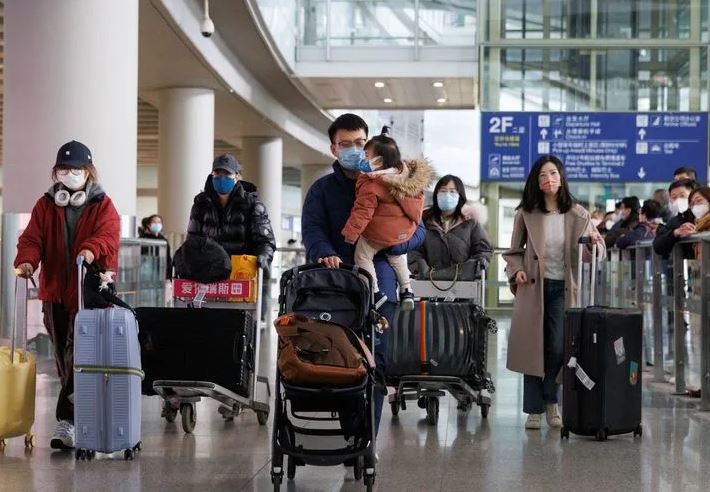The Chinese embassy in Seoul said Tuesday it has stopped issuing short-stay visas for visitors from South Korea, the first retaliatory move against countries imposing COVID-19 restrictions on travelers from China, where the coronavirus spreads uncontrollably.
China reopened its borders on Sunday after three years of lockdown, removing the last major restriction that was part of a “zero contagion” regime that it began abruptly dismantling in early December following historic protests against the restrictions.
Frequent lockdowns, relentless testing and other restrictions on movement since early 2020 have pushed the world’s second-largest economy to one of its lowest growth rates in nearly half a century and caused widespread angst.
China has stopped publishing daily infection counts. Since he reversed his policy, he has been reporting five deaths a day or fewer, figures that have been disputed by the World Health Organization and at odds with reports from funeral homes about increased demand for its services.
The United States, South Korea, France, and other countries introduced testing requirements in response to the COVID-19 outbreak in China.
Some governments have raised concerns about Beijing’s transparency about the scale and impact of the outbreak, while international experts predict at least one million deaths in China this year. Washington has also expressed concern about possible future mutations of the coronavirus.
Although Beijing also requires negative COVID-19 tests for anyone landing in China, authorities last week threatened retaliation against countries that require tests of people coming from China.
In the first move of its kind, the Chinese embassy in South Korea has suspended short-stay visas for visitors from the country.
The embassy will adjust the policy on the condition that South Korea’s “discriminatory entry restrictions” against China are lifted, it said on its official WeChat account.
The announcement comes a day after a phone call between Foreign Minister Qin Gang and his South Korean counterpart Park Jin discussing the restrictions.
China has dismissed criticism of its data as politically motivated attempts to smear its “success” in managing the pandemic, saying any future mutations are likely to be more infectious but less harmful.
On Tuesday, state media continued to downplay the severity of the outbreak.
An article in Health Times, a publication run by the People’s Daily, the official newspaper of the Communist Party, quoted several officials as saying that infections have decreased in the capital, Beijing, and in several Chinese provinces.
Kan Quan, director of the Henan Province Epidemic Prevention and Control Office, said the infection rate in this central province of 100 million people was nearly 90% as of January 6.
Yin Yong, acting mayor of Beijing, said the capital was also past its peak. Li Pan, deputy director of the Chongqing City Municipal Health Commission, said the peak was reached on December 20.
In Jiangsu province, the peak was reached on December 22, while in Zheijiang province “the first wave of infections has passed smoothly,” according to authorities. Two cities in the southern province of Guangdong, China’s manufacturing heartland, reached their peak before the end of the year.
CRITICISMS OF PFIZER
Financial markets dismissed the latest border controls as a mere inconvenience and the yuan hit a nearly five-month high on Tuesday.
Although daily flights in and out of China remain, for the moment, one-tenth of pre-COVID-19 levels, businesses across Asia, including South Korean and Japanese shop owners, Thai tour bus operators and K-pop groups are optimistic about more Chinese tourists.
Overseas spending by Chinese buyers was a market of $250 billion a year before COVID-19.
Retaliation against South Korea has not been the only conflict over COVID-19 that has brewed in China.
State media have also lashed out at Pfizer Inc over the price of its COVID-19 treatment, Paxlovid.
“It is no secret that the forces of US capital have already amassed a great fortune in the world through the sale of vaccines and medicines and the US government has been coordinating it all along,” said the nationalist tabloid Global. Times in an editorial.
Pfizer CEO Albert Bourla said on Monday that the company was in talks with Chinese authorities about the price of Paxlovid, but not about licensing a generic version in China.
The abrupt turnaround in COVID-19 policies has left the Chinese health system unprepared, with many hospitals ill-equipped to care for critically ill patients and smaller cities struggling to get basic supplies of anti-fever medicine.
Yu Weishi, chairman of Youcare Pharmaceutical Group, told Reuters his company had increased production of its fever-reducing drugs five-fold to one million boxes a day in the past month.
Wang Lili, CEO of another pharmaceutical company, CR Double Crane, told Reuters that intravenous drips were his most in-demand product.
Since January 5, the company has operated on weekends to meet demand.
“We work 24 hours a day, 7 days a week,” Wang said.

